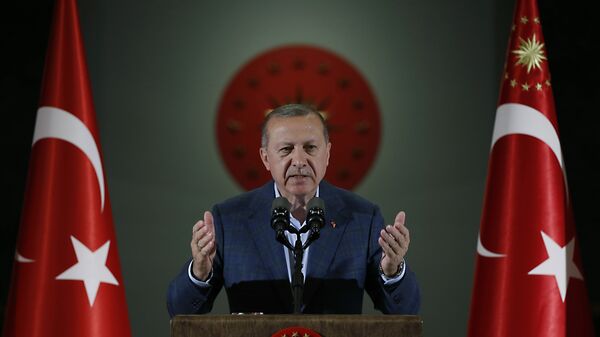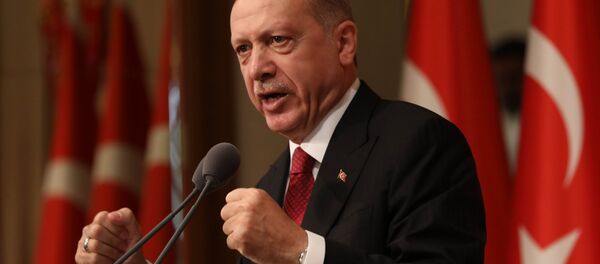During the 10th BRICS summit, Erdogan called on the heads of the member states to take necessary steps so that Turkey could join the platform, which then could be called BRICS. According to the Turkish president, the BRICS members were considering the possibility of involving other countries in the group.
The BRICS summit took place in South Africa's Johannesburg on July 25-27. The group of five major developing economies includes Brazil, Russia, India, China and South Africa. The 2018 summit's host has also invited to the top level talks the leaders of several other emerging economies as a follow-up to China's BRICS Plus initiative.
Political Reason Behind Erdogan's Call For Brics Accession
Dr. Abdullah Aydogan, a research scholar at the Baker Institute for Public Policy at Rice University, told Sputnik that Erdogan’s recent statement reminded the Turkish president’s statement in November 2016 regarding joining Shanghai Cooperation Organization (SCO) after a deluge of criticism from the European Union.
"Erdogan brought SCO idea as a response to European Union's criticisms on Turkey's deteriorating rule of law. Similarly, the BRICS idea was announced in the wake of increasing tension between Turkey and US on Pastor [Andrew] Brunson's imprisonment, as well as US criticism on rule of law," Dr. Aydogan said.
READ MORE: 'By Helping Each Other BRICS Nations Could Diversify Their Economies' — Prof.
The point of view on root causes of Erdogan’s call for joining BRICS in counteraction to the Western criticism was echoed by Dr. A. Kadir Yildirim, a fellow for the Middle East at the Baker Institute for Public Policy at Rice University.
"While Turkey’s current orientation in the Western bloc provides the country with the economic viability and relevance, mounting criticisms from the West and the EU in regards to human rights violations take away much of the benefits Erdogan hopes to reap from the country’s historical Western orientation" Yildirim told Sputnik.
READ MORE: China Says BRICS to Step Up Group Decision-Making Amid US Trade Row
The prospect of Turkey’s joining in BRICS would serve two interrelated goals of Erdogan, Yildirim specified.
"On one hand, Erdogan wants Turkey to be a major regional and global actor, and to remain a relevant economic power", Yildirim noted.
The expert added that the Turkish president also wanted to shift focus from Turkey’s domestic politics and track record in democratization.
Prospects of Turkish Relations With West in Case of Joining Brics
Dr. Aydogan expressed doubt that Erdogan would cut all the ties with the Western countries if Turkey joined BRICS.
"Instead he will prefer to be neither in the West nor outside of the West completely, so that — looking from his perspective and understanding of international politics — Turkey may have a bigger leverage," the expert said.
Dr. Yildirim said he was certain that Erdogan would unlikely shun the West and the EU membership process amid his intention to join BRICS.
"Maintaining relations with the West while seeking alternative arrangements suits well with Erdogan’s long-standing motivation of being a bridge between the East and the West. Such an arrangement also provides him leverage in his negotiations with the West without being constrained by human rights or democratization conditions," Dr. Yildirim said.
In turn, Dr. Aydogan stressed that before any discussions about the membership of an international association, Turkey, first and foremost, needed to restore rule of law and democratic principles.
READ MORE: BRICS Summit: A New Challenge to US Unipolar Domination
On July 19, Turkey lifted a state of emergency, which was imposed following a failed coup attempt in July 2016. A number of Western leaders and international organizations, as well as Turkish opposition, criticized the prolonged emergency measures as jeopardizing human rights and civil freedoms in the country. On July 25, the Turkish parliament approved a new anti-terror bill, which is claimed by the political opposition to be the legalization of a permanent state of emergency in the country.
The views and opinions expressed by the analysts do not necessarily reflect those of Sputnik.





